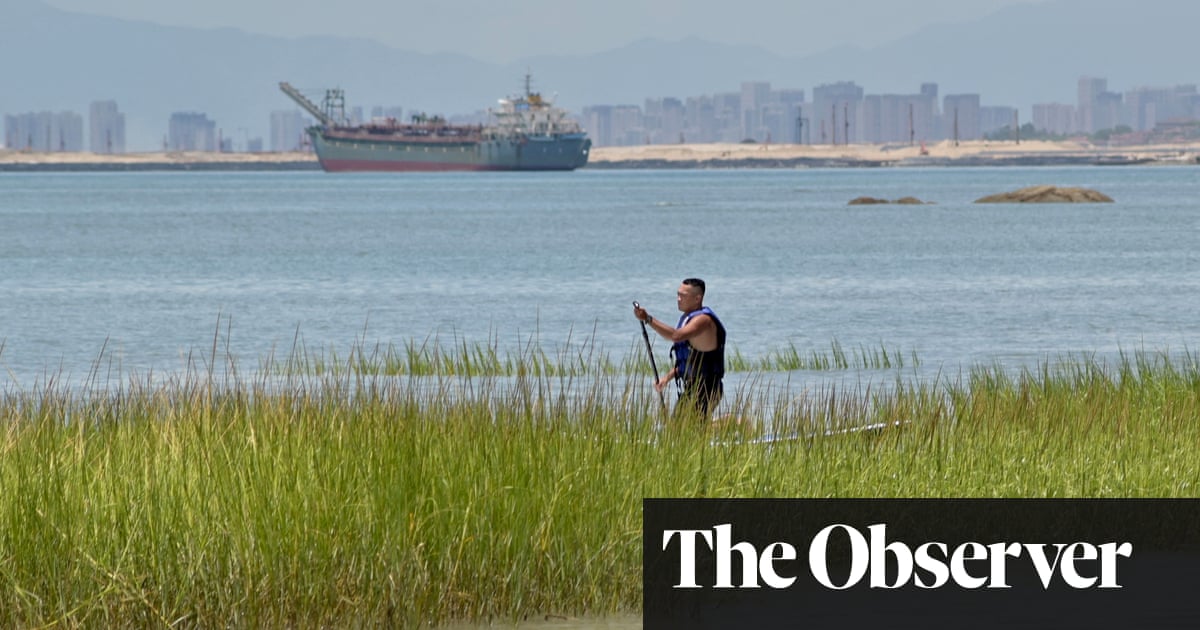
When Li Cheng En pushed his standup paddleboard off the Xiamen beach on China’s Fujian coastline, a mother and son stood nearby, watching him. It was dark, and he moved quickly, but felt sure he’d be caught. Li had spent the day scouting for a secluded beach from which he could launch his bold plan to flee China. But everywhere he went there were fences or security guards and cameras.
“At around 7.30pm, when I decided to go, I thought that there was no more choice for me,” he says. He waited for the security guard shift change. “I rushed into the water and thought that if they would catch me, they would catch me.”
Li entered the heavily guarded waters that span the shortest distance between China and Taiwan. As a surfer, he says he was confident on the board and the water was calm, but it was January, and cold. He passed by what he says were Chinese alarm systems, setting one off.
“It started blaring. I became very nervous at that moment, and I paddled away from that location as fast as I could.”
Hours later, he could sense land in front of him. He arrived on an empty island beach in the Kinmen archipelago, which belongs to Taiwan but sitting is just over three miles from China.
“When I arrived at the Kinmen beach, the wave knocked me off the board. But at the same time, I saw the Blue Tears, it was so beautiful,” he says, referring to the seasonal phenomena of bioluminescence. “Each wave carried blue light, and it made me really happy to see it.”
Li is speaking to the Observer in Taipei. A quietly spoken middle-aged man, he is now living legally but temporarily in Taiwan, restricted from working or leaving the city area. Li is not his real name, which he asked not to be used for fear of repercussions for his family left behind in China. The Observer has verified parts of his story through court documents, GPS tracking of his journey, and Chinese media reports.
Li is among a growing list of dissidents fleeing the increasingly authoritarian rule of Xi Jinping in China. Under Xi, the Chinese Communist party authorities have cracked down on activists, lawyers, counter-culture groups and human rights campaigners. Many have been imprisoned or had exit bans placed on them, preventing them from leaving the country and forcing them to flee by less conventional means.
Earlier this year, Lu Siwei, a Chinese former human rights lawyer, fled over the border to Laos but was detained by Laotian police while trying to board a train to Thailand, and was deported back to China. In August, a Xi critic, Kwon Pyong, fled China by jetski to South Korea, towing barrels of fuel behind him. In September, an activist, Chen Siming, travelled via Laos and Thailand before boarding a plane which made a stopover in Taiwan. He refused to reboard, and spent two weeks living in the airport transit lounge before flying on to Canada for asylum.
In China, Li was an activist, bringing litigation suits against local authorities to defend community rights, and campaigning for human rights causes, including in Hong Kong and Myanmar. He has been questioned, detained and fined. He says that friends who campaigned with him have recently been jailed and he is still under investigation for “subversion of state power”.
“The sentence would be four to 15 years, so I didn’t think I could stay in China any longer,” he says. So he left.
Li’s arrival at Kinmen went undetected, and he says he walked for an hour until he found someone to take him to a police station where he could turn himself in. Court documents reveal the coastguard confiscated two phones, one life jacket, one standup paddleboard, and a paddle.
He spent three months in detention. The Kinmen district court found he had violated immigration and customs laws, and sentenced him to time served. He is now living in the community but cannot support himself and says that NGO-provided assistance will end soon. His passport has expired. While he says that some third countries have said he can travel to them, they wil not allow it without valid documents.
Li has not spoken of his journey publicly before, and has been advised not to. But he feels it could help him. “My family is my biggest concern. The police still go to visit them and pressure them. They even showed my family the photos and videos they had of me on the beach in Xiamen when I was about to leave, to warn them.”
Staying in Taiwan is almost impossible. There is no UNHCR office in Taiwan, which is not recognised as a country by the UN. Taiwan recently decriminalised arriving unlawfully to seek political asylum, but it has no refugee programme, and governments are sensitive to community fears about Chinese infiltration.
Authorities can make case-by-case assessments, and have assisted some Hongkongers to resettle. But the Taiwan Association for Human Rights said that no Chinese national has been granted the right to reside as a “refugee” on a long-term basis “due to the abstract concepts of requirements and stringent conditions” imposed by regulations. Li hopes a third country will let him travel to its borders so that he can claim asylum, resettle, and bring his family out of China. “Taiwan’s government won’t solve this problem for me, and the third countries also think that this is beyond their responsibilities,” he says.












